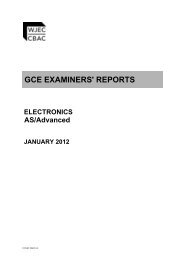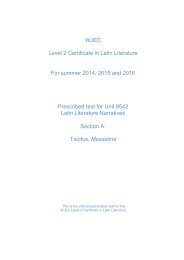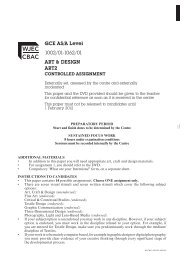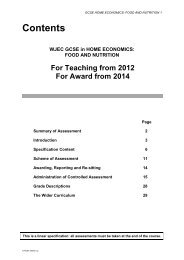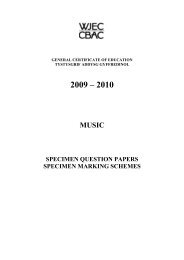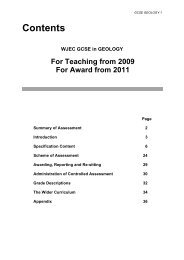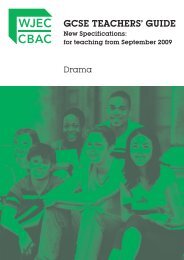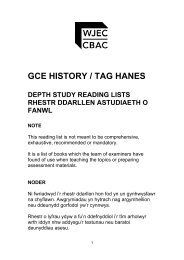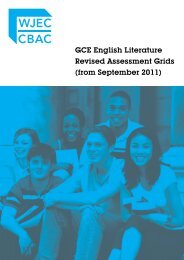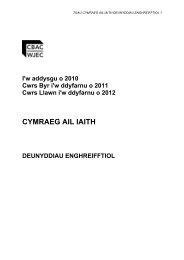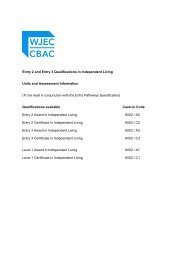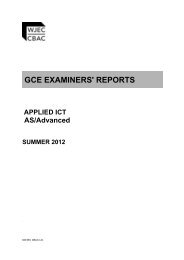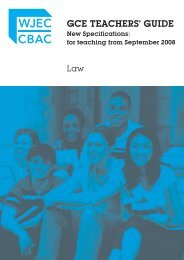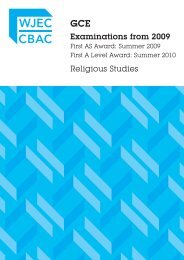WJEC ENGLISH LITERATURE
WJEC ENGLISH LITERATURE
WJEC ENGLISH LITERATURE
You also want an ePaper? Increase the reach of your titles
YUMPU automatically turns print PDFs into web optimized ePapers that Google loves.
power. She again becomes an object to judge and to cast aside as Angel, through his cold<br />
and distant educated language, calls her an ‘unapprehending peasant woman, who have<br />
never been initiated into the proportions of social things.’ Unlike Offred, for whom Atwood<br />
gives some sense of freedom through her ability to pun and playfully deconstruct the<br />
language of male power, Hardy gives Tess no such ability as she suffers unjustly under<br />
Angel’s educated voice.<br />
Despite the fact that Hardy seems to present Tess as a victim of male dominance, there is<br />
much more to the novel than that and much more to Tess’s suffering. It might be argued that<br />
it is not only under men that Tess suffers but also by the members of her own sex. Even in<br />
what is considered to be a feminist novel, Atwood presents the animosity between Offred<br />
and Serena Joy, ‘she didn’t step aside to let me in’ and it is Car Darch’s jealousy that leads<br />
to Alec’s rape at the end of ‘The Maiden’. Moreover, it could be argued that the abuse of<br />
male power isn’t to blame for Tess’s tragedy but fate. Even before she meets Alec, the<br />
narrator suggests that she is ‘doomed’ to meet him first and not Angel. The continual<br />
reference to her ‘strange destiny’ follows Tess to her death as the ‘President of the<br />
Immortals’ ends his ‘sport with Tess.’ Despite the reference to fate here as male, there is a<br />
sense throughout the novel that Tess is made a victim by more impersonal forces as she is<br />
presented as doomed from the outset.<br />
To consider the novel only in terms of female suffering denies the richness of Hardy’s work.<br />
Hardy’s evocative descriptions of the landscape alert the reader to a changing world as the<br />
in dustrial revolution takes hold. It is not only Tess who is violated by this new world,<br />
presented in the guise of Alec, the Stoke-d’Urberville, but also nature itself as the field<br />
animals suffer ‘under the teeth of the unerring reaper’ in ‘Maiden no More’. Hardy’s<br />
description of the reaper foresees the twentieth century’s factory conveyor belt, dehumanising<br />
those who work ‘with clock-like monotony’ because of it. Nature however, isn’t<br />
benign. The name ‘Flintcomb-Ash’ itself creates the hardness and coldness of natures<br />
treatment of the women who work there. In the detailed descriptions of nature, though Tess<br />
becomes often a mere speck, ‘Thus Tess walks on’, the fact that Hardy zooms in on her<br />
reveals her significance and value, ‘a figure which is part of the landscape; a field-woman<br />
pure and simple.’ There is a sense of suffering here perhaps but also of beauty and strength<br />
and fortitude. Woman is not merely presented as a victim but as a strong and stoical figure.<br />
‘Tess of the D’Urbervilles’ can be read as a novel of the suffering of women at the hands of<br />
men yet the denouement of the novel suggests that there is much more here. Although not<br />
immediately clear, just as Atwood plays with narrative technique, using fairytales and the<br />
unreliable narrator for example, Hardy also plays with his use of the narrative voice. At<br />
times, the narrator gives us a socio-historical account of a place or an area. At other times,<br />
the narrative seems like an extract from a travel journal while, as previously discussed, there<br />
are philosophical musings and a consideration of a variety of issues such as organised<br />
religion, pagan beliefs and the idea of fate. It is interesting that at the end of the novel, as the<br />
rhythm slows and time stands still through the short sentence, ‘It was a black flag’, signifying<br />
Tess’s death, Angel and Liza-Lu, ‘arose, joined hands, and went on.’ Hardy seems to<br />
suggest that neither fate, nor history, nor religion, nor philosophy can make sense of human<br />
suffering. The only option available is simply to arise and go on. Perhaps Atwood alludes to<br />
the same idea at the end of ‘The Handmaid’s Tale’ as Offred steps up into the ‘darkness<br />
within; or else the light.’ The uncertainty of what faces her is the same human condition that<br />
Angel and Liza-Lu face at the end of ‘Tess’ and which faces all of us in a world of suffering,<br />
seemingly devoid of meaning.<br />
Comment [r22]: A02<br />
language shapes meaning,<br />
implicit meanings<br />
Comment [r23]: A01<br />
terminology<br />
Comment [r24]: A04 context<br />
of partner illuminates core<br />
Comment [r25]: A03<br />
comparison<br />
Comment [r26]: A03 other<br />
readings<br />
Comment [r27]: A04<br />
significant and productive<br />
comparison<br />
Comment [r28]: A03 clear<br />
and confident judgements,<br />
explores interpretations<br />
Comment [r29]: A02<br />
confident handling of implicit<br />
meanings<br />
Comment [r30]: A02/A03/A0<br />
4 confident handling and<br />
overview/other<br />
readings/relevant social<br />
context<br />
Comment [r31]: A04 social<br />
context<br />
Comment [r32]: A02 sound<br />
analysis<br />
Comment [r33]: A02<br />
language<br />
Comment [r34]: A02 form<br />
(narrative technique)<br />
Comment [ r35]: A02/A03<br />
detailed critical<br />
understanding/offers<br />
alternative reading to task<br />
Comment [r36]: A02<br />
structured, accurate, fluent<br />
Comment [r37]: A03 specific<br />
connection<br />
Comment [ r38]: A02<br />
overview, awareness of<br />
structure and form<br />
Comment [r39]: A02<br />
structure<br />
Comment [r40]: A02 implicit<br />
meanings<br />
Comment [r41]: A01/A02/A0<br />
3 confident, accurate,<br />
fluent/sound analysis and<br />
evaluation/specific and<br />
productive connection<br />
10



